 "Where's the next gas station with 150-octane?"
"Where's the next gas station with 150-octane?"Source here
It's been a long time since I wrote anything vaguely technical here and I apologise for this to my visitors. However, needs must and I have been busy with a number of things.
First the eccentric heading to this post. The first four words are a colloquial reference to the four-stroke or Otto, cycle - that which powers all our Fulvias. The fifth word owes its presence ot the fact that over the past months I have received a number of emails from Fulvia 1600 owners who complain of "pinking" (known in the U.S. as "pinging").
Despite what you will hear in the pub, "pinking" is DETONATION. Detonation is a Bad Thing and should therefore be addressed as soon as possible. I have been doing a little research in order to provide some reliable information for you in the hope that you will be able to avoid this dangerous phenomenon.
First we have to distinguish between detonation and pre-ignition - in my many years around cars and their owners, I have long been aware that considerable confusion exists about these.
Pre-ignition occurs as a result of something in the chamber being so hot that the mixture ignites before the spark. Typical causes are incorrect heat range of plug, a red-hot sharp edge in a badly modified combustion chamber, or glowing carbon residues. A typical symptom of pre-ignition is "running-on" after the engine has been switched off.
Detonation occurs when the advancing flame front at the time of ignition causes some of the remaining mixture in the combustion chamber to ignite spontaneously - i.e. before the flame front reaches it, so an explosion results. There are various causes of detonation. The best known are excessive compression ratio for the type of fuel being used, lean mixture, poor chamber design, bad gas-flowing, excessive ignition advance or any combination of some or all of these.
It is important to understand that the real danger point is that where maximum torque (or indeed Brake Mean Effective Pressure) is developed, for it is at this point where the engine is at its most volumetrically efficient - that is the cylinders contain the largest quantity of mixture achieved in the engine's rev-range. So putting your foot flat on the floor at around 4500 - 5000 rpm in a Fulvia is the time when real trouble might be expected.
Another fact that is often not understood is that a petrol engine's compression ratio, despite being quoted in the specification as say 10.5/1 in the case of a 1600 Fulvia, is variable! It is of course controlled by the accelerator pedal - when the throttles are shut, there is effectively nothing to compress. I recall driving in Italy in my own Fulvia (C.R. about 11/1) and being very frustrated because unlike elsewhere in Europe 98 octane petrol cannot be purchased - only Shell garages have "proper" petrol but at a price. So with the Fulvia's rather small tank, it was necessary to fill up with the so-called "premium" 95 octane stuff. Just to be on the safe side, I was careful to avoid large throttle openings and thus avoided problems.
I have found that when 1600s "pink" or knock, it is nearly always at low revolutions when accelerating. Two possible causes (and a third I shall come to in a moment) suggest themselves to me. First the miserable Solex 42DDHF carburettor; my readers well know my views on this excuse for a carburettor. Every one I have seen has enormous play in its spindles. this causes the uneven idle problems that has caused many to install the unsuitable 35mm Dell'Ortos which are perfect on 1300s (the Dell'Orto is a proper carburettor). The point is that when in "pick-up" mode the Solex provides fuel via the idle circuit and into the progression drillings which may be seen adjacent to the butterfly. Additional air entering via the slack spindle bushes may be enough to cause problems. Another possibility is timing chain slack which causes severe ignition timing variations. The third idea comes from a Carroll Smith book. he advised people to buy their fuel from a busy station that has a large turn-over as it is less likely that some of the more volatile elements of the fuel blend will have evaporated by the time of purchase. Thos considering gas-flowing should remember not to polish the ports to mirror finish but to leave them slightly rough; this prevents fuel dropping out of atomisation. My own car has Lucas mechanical fuel injection and despite all the modifications, I have never had pinking problems, which suggests that the carburettors and/or the inlet tracts may be in part to blame.
There is of course, plenty of information on the Web about this subject: Wikipedia is a good start. The technically-minded will be interested in two articles here and here. The two pieces are links from the Wikipedia article. In the same article there is a link to a company offering water-methanol injection; this was pioneered by the Luftwaffe during the war and greatly improved the performance of their Focke-Wulf 190 aircraft.
And talking about aircraft, if you feel you have problems feel sorry for the developers of the Hawker Tempest. Here's a quote from a footnote from this Wikipedia site:
Despite what you will hear in the pub, "pinking" is DETONATION. Detonation is a Bad Thing and should therefore be addressed as soon as possible. I have been doing a little research in order to provide some reliable information for you in the hope that you will be able to avoid this dangerous phenomenon.
First we have to distinguish between detonation and pre-ignition - in my many years around cars and their owners, I have long been aware that considerable confusion exists about these.
Pre-ignition occurs as a result of something in the chamber being so hot that the mixture ignites before the spark. Typical causes are incorrect heat range of plug, a red-hot sharp edge in a badly modified combustion chamber, or glowing carbon residues. A typical symptom of pre-ignition is "running-on" after the engine has been switched off.
Detonation occurs when the advancing flame front at the time of ignition causes some of the remaining mixture in the combustion chamber to ignite spontaneously - i.e. before the flame front reaches it, so an explosion results. There are various causes of detonation. The best known are excessive compression ratio for the type of fuel being used, lean mixture, poor chamber design, bad gas-flowing, excessive ignition advance or any combination of some or all of these.
It is important to understand that the real danger point is that where maximum torque (or indeed Brake Mean Effective Pressure) is developed, for it is at this point where the engine is at its most volumetrically efficient - that is the cylinders contain the largest quantity of mixture achieved in the engine's rev-range. So putting your foot flat on the floor at around 4500 - 5000 rpm in a Fulvia is the time when real trouble might be expected.
Another fact that is often not understood is that a petrol engine's compression ratio, despite being quoted in the specification as say 10.5/1 in the case of a 1600 Fulvia, is variable! It is of course controlled by the accelerator pedal - when the throttles are shut, there is effectively nothing to compress. I recall driving in Italy in my own Fulvia (C.R. about 11/1) and being very frustrated because unlike elsewhere in Europe 98 octane petrol cannot be purchased - only Shell garages have "proper" petrol but at a price. So with the Fulvia's rather small tank, it was necessary to fill up with the so-called "premium" 95 octane stuff. Just to be on the safe side, I was careful to avoid large throttle openings and thus avoided problems.
I have found that when 1600s "pink" or knock, it is nearly always at low revolutions when accelerating. Two possible causes (and a third I shall come to in a moment) suggest themselves to me. First the miserable Solex 42DDHF carburettor; my readers well know my views on this excuse for a carburettor. Every one I have seen has enormous play in its spindles. this causes the uneven idle problems that has caused many to install the unsuitable 35mm Dell'Ortos which are perfect on 1300s (the Dell'Orto is a proper carburettor). The point is that when in "pick-up" mode the Solex provides fuel via the idle circuit and into the progression drillings which may be seen adjacent to the butterfly. Additional air entering via the slack spindle bushes may be enough to cause problems. Another possibility is timing chain slack which causes severe ignition timing variations. The third idea comes from a Carroll Smith book. he advised people to buy their fuel from a busy station that has a large turn-over as it is less likely that some of the more volatile elements of the fuel blend will have evaporated by the time of purchase. Thos considering gas-flowing should remember not to polish the ports to mirror finish but to leave them slightly rough; this prevents fuel dropping out of atomisation. My own car has Lucas mechanical fuel injection and despite all the modifications, I have never had pinking problems, which suggests that the carburettors and/or the inlet tracts may be in part to blame.
There is of course, plenty of information on the Web about this subject: Wikipedia is a good start. The technically-minded will be interested in two articles here and here. The two pieces are links from the Wikipedia article. In the same article there is a link to a company offering water-methanol injection; this was pioneered by the Luftwaffe during the war and greatly improved the performance of their Focke-Wulf 190 aircraft.
And talking about aircraft, if you feel you have problems feel sorry for the developers of the Hawker Tempest. Here's a quote from a footnote from this Wikipedia site:
Early Tempests suffered some engine problems mainly due to the 150 octane fuel being inadequate. One fault discovered was a problem with the propeller constant speed unit, which allowed the Sabre engine to go well beyond permissible rpm, leading to seizure or explosion. There were also problems with the induction system, the lubricating system, and the carburettor air intake (a simple backfire could lead to an explosion).
Any chance of Shell coming up with some 150-octane fuel I wonder? It would most likely be "adequate" for a Fulvia!
A bientôt.


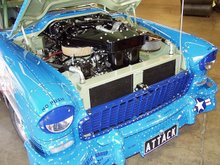
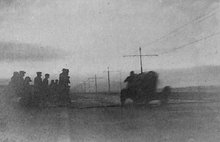

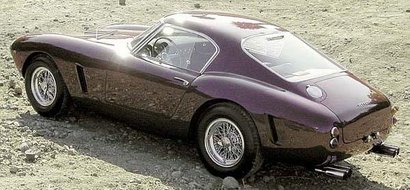
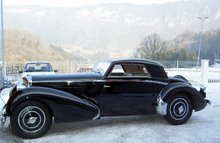
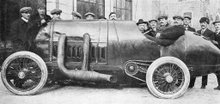


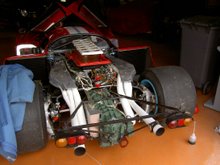

1 comment:
Now is the time to carry on and discuss some ignition mods.
This is a good start!
Post a Comment